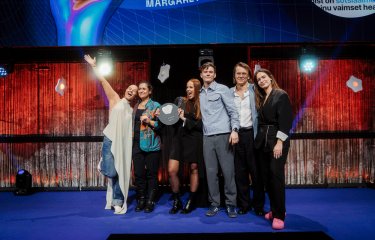Graduate returns to Falmouth to embed sustainability into design curriculum
18 June 2021

Megan Coe graduated from BA(Hons) Interior Design in 2019, and has since been working in Cornwall for local architectural practice Koha Architects. Megan has been working with the current third year Interior Design students in embedding 'sustainability' within the curriculum.
We caught up with Megan to find out about her life since graduation and the importance of sustainable design.
Can you tell us about your experience of Falmouth University?
I studied at Falmouth between 2016 and 2019. I always figured that I should have studied Architecture, and I’m now changing tack in my professional life to aim for my Masters in Architecture. However, the teaching on interiors at Falmouth was so engaging and gave me so many opportunities to self-direct projects, I wasn’t interested in changing degrees.
Having a background in interiors is an unconventional way to enter the world of architecture, but it’s allowed me to really appreciate the importance of learning to work with existing buildings, preserve heritage and concentrate on conservation projects.
My final degree project ‘Kreft’, proposed the remodel of three derelict buildings on a local historical site. It was comprised of a series of craft workshops, which aimed to combat the extinction of heritage crafts while reconnecting the ‘time poor’ user with hand-led processes.
I love supporting the students to create more sustainable projects, so I’m really thankful to the staff who have continually provided me with the opportunity to do so.
Why did you choose to stay in Cornwall after you graduated?
I knew that I’d choose to remain in Cornwall after graduation since my uni interview in 2016. After applying to Falmouth on a whim, I attended my interview and quickly withdrew my applications to all other unis.
I knew instantly that this was the only place for me, it felt like home from the get-go. There’s something incredibly special about living in such a creative, community orientated place with such an appreciation for craftsmanship.
How has your career progressed since your graduation?
After graduating in 2019, I joined the team at Koha Architects, a local practice based in the Innovation Centre on Penryn Campus. Working with a small, hands-on practice was the perfect introduction to the industry for me, and quickly improved my skillset and knowledge of the industry.
I predominately work on community-led projects. Right now, I’m working on a refurbishment project in St Austell to retrofit a pub into a new mixed-use space for a local church group and assisting on a project to introduce sheltered housing into Redruth.
You’re a Coordinator for the Architects Climate Action Network (ACAN) – what kind of work does the organisation do?
ACAN is a network of individuals within architecture and related built environment professions taking action to address the twin crises of climate and ecological breakdown.
The organisation was founded in 2019 to transform the construction industry, which contributes a staggering 40% of the UK's carbon emissions.
We acknowledge that rapid change is required and are harnessing our collective agency to bring about the necessary changes within our industry.
I became involved with ACAN as a volunteer in the autumn of 2020, when my conflict surrounding my passion for protecting the environment clashed with my professional life, to the point that I needed to actively work towards rapid change in the industry if I were to continue pursuing architecture as a career.
I am now a coordinator for the ‘Education’ group, working toward incorporating sustainability into the curriculum and better equipping graduates with the knowledge and tools to design in a truly sustainable manner in their future careers. This is essential in tackling the problem at hand, it all starts with education.
You’re now working with third year Interior Design students to set up their own Student Climate Action group, embedding sustainability into the curriculum. Tell us a little about that.
At ACAN earlier this year, following on from the success of the earlier Climate Curriculum Campaign, we launched the Students Climate Action Network (StuCAN). StuCAN is a new arm of ACAN Education which seeks to increase climate literacy at all levels of higher education within the built environment.
After doing some guest lecturing with the level threes this year, covering sustainable strategies for their final design projects, I pitched the idea of forming a Falmouth University Climate Action group.
FalCAN is a student-led group which is in its early stages with the plan to expand next academic year. Ultimately it will be a safe space for all students to ‘knowledge share’ and learn how they can combat the climate and ecological emergency in their uni work and future careers.
StuCAN are encouraging and supporting the formation of these student-led groups across the country, and now have 20+ university climate groups across the UK alone with several forming overseas.
We have formed a network and sharing platform for the groups to connect with one another, resource share, plan collaborations/events with one another and ultimately further their climate education.
It feels great to be back at Falmouth and doing some teaching this year. I love supporting the students to create more sustainable projects, so I’m really thankful to the staff who have continually provided me with the opportunity to do so.






